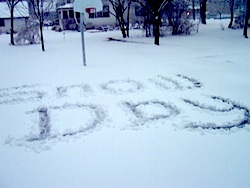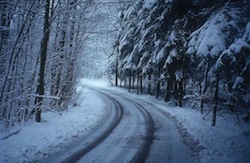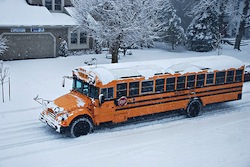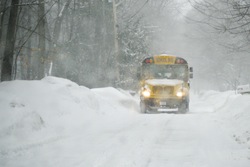12 Mar The snow day debate continues

Too damned many.
In response to my note about the 40-something Norwegian who had never seen a snow day until he came to Nova Scotia, Contrarian reader Joyce Rankin of Mabou Westmount blames consolidation of schools and secularization of society for the proliferation of snow days. Her response sparked a lively email debate.
I remember we never used to have snow days either. But then again, we were close enough to school that we could walk.
The questions to ask, for a proper comparison, would be how far children in Norway travel to school, and how far people drive to work, and over what kind of roads? And if there’s not an official snow day, does that mean that everyone shows up? Or does it mean that those who can make it come and the place functions (or not) with a skeleton crew, accomplishing little.

You can drive in this.
All valid points. But it could also be there that Norwegians are just a little less timid about driving when there is half an inch of snow? We do have snow tires after all. This implies that driving on snow is something we do.
Why doesn’t Alberta have snow days? We have too many damn snow days. I hear it from everyone.
It’s not so much snow that’s the problem, but rather ice. In Alberta it tends to get cold and stay cold, and it is not as wet. Not so much temperature fluctuation and hence less ice. Plus in areas where it’s flatter and the roads are straighter, the driving is easier. (Note that the accident often happen at curves and hills.)
I’m not disagreeing that it gets a bit silly sometimes. But the school board is to blame, too, because the new procedure is for the board superintendent to make the call for the whole district, rather than the principal making it for each school. I guess they haven’t noticed the variation in weather from, say, Ingonish to Sydney River to Louisbourg, or from Pleasant Bay to Louisdale to Canso to Antigonish.
Plus it’s because of liability. Administration is afraid that someone will get hurt and they’ll get sued for making them come to work.

Birds do it. Squirrels do it. Even bright yellow buses do it.
I take your point about one-size fits all in boards that stretch over a huge territory. But I think the issue shows a problem with the way society handles small risks of terrible outcomes. We place policy makers in an invidious position. They might be criticized for over caution, but they would be savaged if a child is injured or killed. But life is not risk free.
This issue also dovetails with another bugaboo of mine: the fact that too many school system managers, up to and including superintendents, are in the teachers’ union. Unions should not be given the task of deciding when a day off is appropriate.
The bottom line is that we have far too many snow days in NS. We have snow days where there is barely any snow. We have snow days on days we would not have given a second thought 15 years ago. It has crept up on us, and it has gone too far.
I have driven long distances on bad roads to work, and I have worked in places where there’s a lot of pressure to be at work no matter what (and where you don’t get paid if you don’t come in).
It would be interesting to compare accident stats –was there a larger percentage of serious accidents and fatalities when people were more willing to drive on icy roads? I’m guessing yes.

Some wintry jurisdictions keep on bussin'.
While you’re at it, compare snow-day attendance at Nova Scotia ski hills compared to weekdays when schools remain open.
I think one of the results of secularization is that people value themselves and their physical well-being more than they used to. We expect to have control over our lives. We have less of the kind of humility that a) leaves it up to God or to fate, and b) views oneself as only one of many. We have learned to expect that we should be taken care of and insulated from risk. Most workplaces are much safer than they used to be, fewer people work outdoors, and there’s less call to be tough and resilient. (Which probably explains the rise of extreme sports -these are the people who in another century would have gone to sea or been a trapper or something.)
We expect things to be okay, we see it as an entitlement. And when something does go wrong, we want to blame it on someone. People in administration know this, and they don’t want to be the one blamed.
